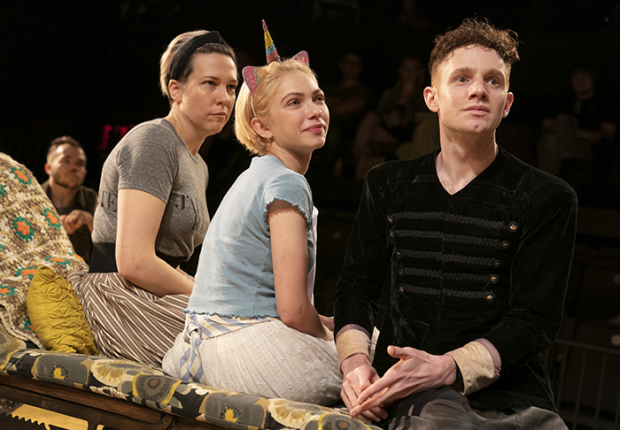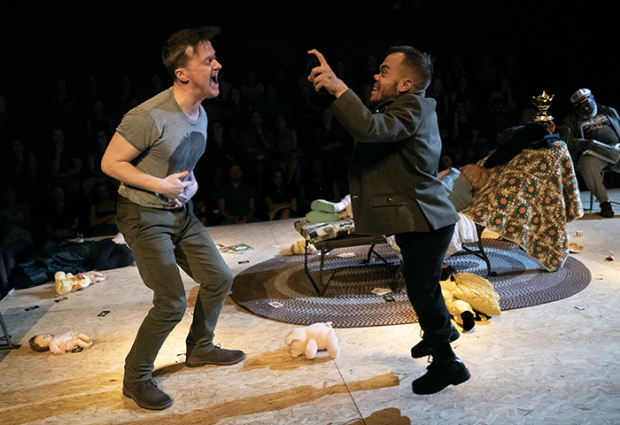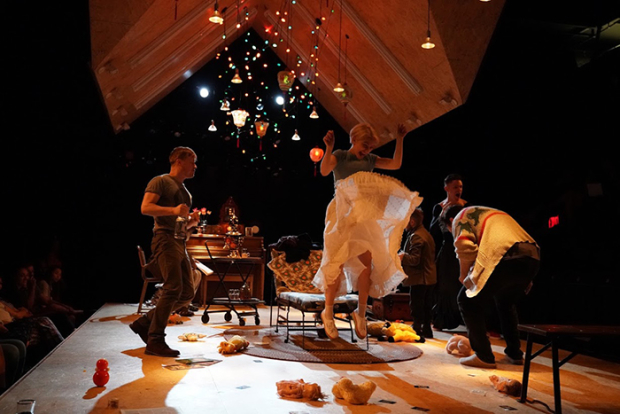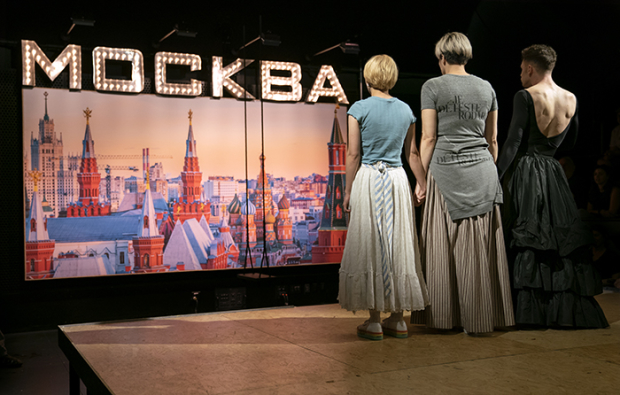Looking for Elusive Dreams in Moscow Moscow Moscow Moscow Moscow Moscow
Halley Feiffer’s adaptation of Anton Chekhov’s ”Three Sisters” allows us to laugh at our own tragedies in its New York premiere with MCC.

(© Joan Marcus)
"That's what life is, I think. Just doing horrible things — and complaining about them." It's Masha, the unhappily married middle Prozorov sister, who proposes this inelegant but incisive theory in Halley Feiffer's comic version of Chekhov's Three Sisters, pertly titled Moscow Moscow Moscow Moscow Moscow Moscow (now in its New York premiere at MCC's new Robert W. Wilson Theater Space). Chekhovian misery is a special cocktail of nihilism and crushed dreams, and sisters Olga, Masha, and Irina bathe themselves in it as they dream of returning to Moscow — the one thing they think could possibly bring them an ounce of happiness as they drown in the Russian countryside, which, according to everyone, "blows."
Spoiler alert: Moscow isn't the answer. Even the sisters know it on some level as they chant the name of that idyllic metropolis while gazing at a sign that reads "Mockba" at the far end of the theater (Mark Wendland designs the impertinent set, complete with what look like Christmas lights and hanging Chinese lamps). In that respect, Feiffer didn't have to change much to make the futility-fueled Three Sisters a comedy. With a firm grasp of the original play and a thrillingly rebellious spirit, Feiffer simply paints life (for everyone, not just depressed Russians) in the absurd light it deserves and makes the choice to laugh instead of cry. Well — the characters do plenty of crying, and our laughing is not a choice (Feiffer has never been one to shy away from crude humor).

(© Joan Marcus)
For a sense of Moscow's dialogue, imagine that Feiffer ran an English translation of Chekhov's text through a sieve, boiled it down to its most essential components, and had it translated once more by the ensemble of HBO's Girls. Can the incessant whining and cursing and mean-spirited howling become grating? Absolutely. But Feiffer and director Trip Cullman (who also directed the play's excellent world-premiere production at Williamstown Theatre Festival in 2017) only cross that line when the pain the characters are feeling becomes equally unbearable.
Beyond that all-important threshold, we're forced to feel that Chekhovian desperation. Behind it, everything and everyone is deliciously sardonic: The self-loathing Olga (played by the perfectly stone-faced Rebecca Henderson) monologues about her hideous looks that repelled all of her potential husbands and left her with a headache-inducing teaching career; the despondent Masha (a gender-bending Chris Perfetti as a melodramatic poetry-spouting goth) lives in disgust of her Latin-teaching husband, Kulygin (Ryan Spahn plays the one pathetic dope to robotically claim happiness); and the newly 20-year-old Irina (Tavi Gevinson, transitioning from youthful malaise to mature despair) fends off marriage proposals from the probably-gay army lieutenant Tuzenbach (a comically fluent Steven Boyer), as well as the odd army captain Solyony (a manic, yet sympathetic Matthew Jeffers), whose struggle as a social outcast brings some of the play's greatest tragedies to a head.

(© Joan Marcus)
Also circling the sisters are their brother Andrey (Greg Hildreth, playing a soft-spoken sad sack), who gets seduced into life's inexorable cycle of marriage and fatherhood by the battle-ax Natasha (Sas Goldberg, bringing out some hilarious claws); the dashing lieutenant Vershinin (Alfredo Narciso, combining charm with witlessness), who pursues an affair with Masha while his wife relentlessly attempts suicide; and doctor Chebutykin (Ray Anthony Thomas, with the biggest downward spiral of the bunch), who is also a recovering alcoholic and Irina's real father. The aging Ferapont and Anfisa (Gene Jones and Ako, respectively) occasionally come out of the shadows as well, silently marching toward death with wry Russian stoicism.
Don't be fooled by Chebutykin's Mr. Pibbs T-shirt, or Olga's wardrobe of interchangeable J'aime Rodarte/Je Deteste Rodarte merchandise (a fun nod to meaninglessness by costume designer Paloma Young), or the ear-blasting rave that lighting designer Ben Stanton and sound designer Darron L. West orchestrate in the middle of the play. Moscow, like its dramatic predecessor, is set at the turn of the 20th century during the rise of Czar Nicholas II, and its characters, who may have lost hope for their own lifetimes, look ahead hopefully to the next few hundred years. Tuzenbach, in his own superficial way, excitedly predicts that "clothes will be dope as sh*t." For his sake, it's probably best he doesn't know that the future — quite literally — looks exactly the same.

(© Joan Marcus)







